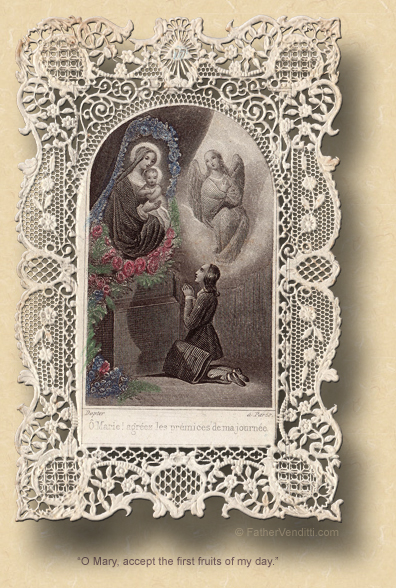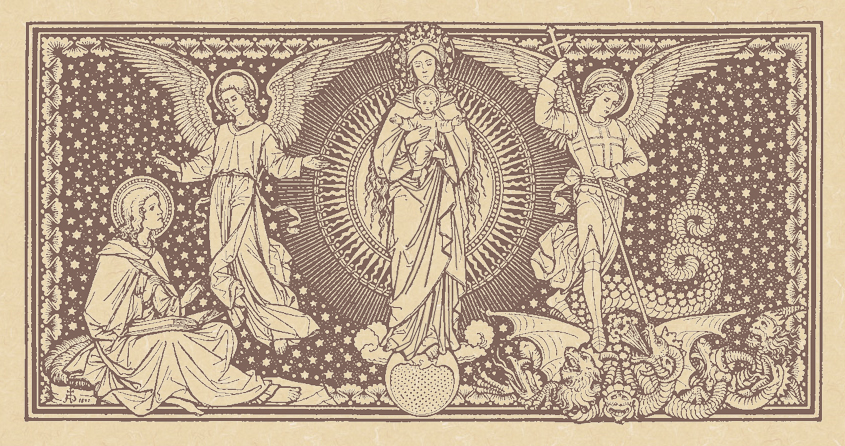Saint Luke Strikes Again.
The Thirty-First Saturday of Ordinary Time; or, the Memorial of the Blessed Virgin Mary on Saturday.
Lessons from the secondary feria, according to the ordinary form of the Roman Rite:
• Philippians 4: 10-19.
• Psalm 112: 1-2, 5-6, 8-9.
• Luke 16: 9-15.
…or, any lessons from the common of the Blessed Virgin Mary.
The Fourth Class Feria of the Blessed Virgin Mary on Saturday.
First lesson from the common "Salve, sancta Parens…" of the Blessed Virgin Mary "After Trinity Sunday until Advent," the rest from the primary of the same common, according to the extraordinary form of the Roman Rite:
• Ecclesiasticus 24: 23-31.
• [Gradual] Benedicta et venerábilis es…*
• Luke 11: 27-28.
The Twenty-Fourth Saturday after Pentecost; the Feast of the Holy Martyrs Galaction & Episteme; and, the Remembrance of the Passing of the Blessed Martyr Gregory Lakota, Auxiliary Bishop of Przemysl.**
Lessons from the pentecostarion, according to the Ruthenian recension of the Byzantine Rite:
• Galatians 1: 3-10.
• Luke 9: 1-6.
FatherVenditti.com
|
 10:06 AM 11/5/2016 — Inasmuch as we’ve looked at today’s Gospel lesson a number of times before, I wasn’t going to preach a homily today; but, inasmuch as it’s also First Saturday, and we’re having a Holy Hour after Mass as we usually do on First Fridays and First Saturdays, I didn’t want to leave you with nothing to talk to our Lord about;—not that you need me to tell you what to speak about with our Lord—and, for the benefit of those keeping the devotion of the Five First Saturdays, I will return to the confessional during the Holy Hour so that those observing that devotion but who weren’t early enough to confess before Mass can do so. Just like yesterday, Benediction will be at one-thirty. 10:06 AM 11/5/2016 — Inasmuch as we’ve looked at today’s Gospel lesson a number of times before, I wasn’t going to preach a homily today; but, inasmuch as it’s also First Saturday, and we’re having a Holy Hour after Mass as we usually do on First Fridays and First Saturdays, I didn’t want to leave you with nothing to talk to our Lord about;—not that you need me to tell you what to speak about with our Lord—and, for the benefit of those keeping the devotion of the Five First Saturdays, I will return to the confessional during the Holy Hour so that those observing that devotion but who weren’t early enough to confess before Mass can do so. Just like yesterday, Benediction will be at one-thirty.
You might recall a few weeks ago, on the Feast of Saint Luke, how I had tried to impress upon you the brilliance of the man who gave us the third account of our Lord’s life and how he filled it with subtle and sometimes even cryptic linguistic tricks, noticeable only to those fluent in Greek, to indicate very sublime truths. Today’s lesson is just such an instance. The word in question, around which Saint Luke has centered the point of our Blessed Lord’s sermon to his disciples, is “mammon,” or μαμωνᾷ in Greek, from the root μαμωνâs. It’s a very rare word, and even Luke’s Greek-speaking readers would have had to look at it twice, and may even have had to go look it up. In almost all English translations of the Holy Gospel, it’s rendered as “wealth” or “money,” but it means something more than that. One of the frustrations in trying to learn some of these ancient languages is that there are so many different words which the Lexicon translates in the same way, because the words don't exist in English which would distinguish between them. So, in your Bible the word may read as “money,” and in English money is money. But in Aramaic or Hebrew,—or, in the case here of Saint Luke, Greek—you may have five different words that mean money, and each one says something different about it or the person who owns it or uses it. Mammon is wealth or money, but with a certain quality of personification. When it’s used as the object of a sentence, it implies some kind of reciprocal human-like relationship to the subject of the sentence. So when one possesses mammon or μαμωνâs, one not only possesses money but is also possessed by it.
Which kind of sums up our Lord’s whole point, doesn’t it? Saint John Chrysostom explains for us exactly how the choice of this word defines the whole meaning of our Lord’s narrative. It’s not the possession of the wealth that’s the problem; it’s the possession that the wealth holds over us that’s the problem. The Greek language gives you the option of speaking about inanimate objects as persons because it is a fact of life that such objects can become virtual “persons” to those who desire them. Money becomes mammon when obtaining or preserving it becomes the focus of my life, a relationship which should exist only with another person. It’s all right to focus on your husband or your wife, it’s all right to focus on your children, it’s all right to focus on God, but to focus on something that is not a person is wrong. It robs all the other “persons” in your life of their humanity. You end up giving human dedication to something that is not human, thus making all the other people in your life less than human by subordinating them to something that has no life.
And this, I think, is a very good way to understand the point our Lord is making, or at least what Saint Luke would like us to take away from what our Lord is saying. There are all kinds of things we need to fulfill our obligations to the people whom we love. One of them is money. You can’t feed a family or put a roof over their heads without it.  But every month you’re handed that pay check, as abundant or as meager it may be, it isn’t the number of digits on the check that should give you satisfaction; it’s what that number should represent to the person who has his life well-ordered: the meeting of his responsibilities to those who depend on him. But every month you’re handed that pay check, as abundant or as meager it may be, it isn’t the number of digits on the check that should give you satisfaction; it’s what that number should represent to the person who has his life well-ordered: the meeting of his responsibilities to those who depend on him.
The ancient Desert Fathers we remember as the supreme teachers of holiness. But in another sense we have to recognize that, spiritually speaking, they took the easy way out. By forsaking all material possessions and retreating into the solitude of the desert, they isolated themselves from everything that could possibly come between God and themselves. We don’t have that luxury. We depend on others and others depend on us, in marriage, in the priesthood, in any number of situations in which we may find ourselves. They were like alcoholics who completely gave up drink; we are more like compulsive over-eaters who can’t give up food, but must try somehow to live with it in a modified and detached way—which, when you think about it, can be a much more difficult thing.
We can, therefore, presume that the good Saint Luke recorded our Lord using the word that he used very deliberately. It isn’t a question of how much, but a question of why? When two people get married and look forward to a family, they’re concerned with creating a home and an environment in which a family can flourish; but, as the years pass that focus can get lost; we can become so immersed in the various activities that keep the check coming in, that we can forget the reason for it all. Work and job, then, become goals in themselves; not that we consciously make them so, but that through years of going through the motions we have forgotten what it’s all for.
And this is true not only in reference to our families but most especially in reference to God. After all, just as material wealth exists for the benefit of our families, so our families are really nothing more than a means to bring ourselves and others closer to Christ. That’s why marriage is a sacrament: it is a way to God. One gets married precisely because two souls seeking perfection have a much better chance of success than one soul alone, because they temper each other, and limit each other, and motivate each other to do what is right. Otherwise, she exists only to please me, and I exist only to please her, when the reality should be that we both exist to help one another please God. And this is self-evident: how many people have we met along the way who would never go to church except that, somewhere along the line, they married someone who practiced the Faith? How many couples are there who honestly know that they would never have continued to practice the Faith after marriage were it not for the fact that they needed a baby baptized, or felt guilty about not raising a child in a religious environment. And while some might question the purity of such motives, the fact is that it’s exactly this sort of thing that marriage and family are for.
The longer I live the more I’m convinced that everything we do has some kind of ulterior motive, but that’s OK just so long as that ulterior motive draws us in a positive direction, and not away from our Lord like mammon. In the end, no matter what we do, no matter what reason we think we have for doing it, it must be something that will lead us to God. And it will be, as long as it’s not mammon, as long as we can see the will of God in every task of life. And that happens when we train ourselves to see, in everyone who depends on us, the face of Christ.

* The Gradual is non-Scriptural: "Blessed and venerable art Thou, O Virgin Mary: Who without blemish to Thy maidenhood, wert found to be the Mother of the Saviour. O Virgin, Mother of God, He Whom the whole world cannot contain, enclosed Himself in Thy womb and became Man."
** Galaction and Episteme were husband and wife respectively. They suffered torture and martyrdom under the Emperor Decius. At the time of their deaths, Galaction was thirty years old, his wife bearly sixteen.
Bishop Lakota was ordained in 1908 at Przemysl. He received his Doctorate in theology in Vienna in 1911, then served as professor of theology at the Ukrainian Catholic seminary at Przemysl beginning in 1913, eventually becoming Auxiliary Bishop of Przemysl. Arrested for his faith on June 9th, 1946, he was sentenced to ten years at Vorkuta, Russia, where he died in prison in 1950.
|

